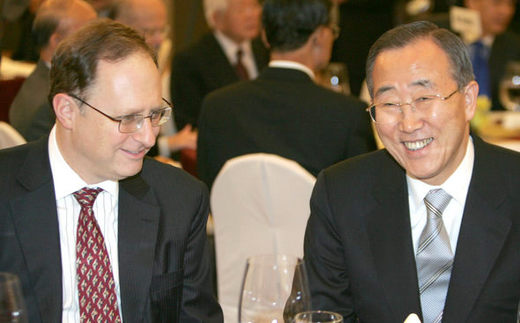 |
|
The U.S envoy to Seoul Alexander Vershbow and South Korea's foreign minister Ban Ki-moon.
|
The Bush administration has seen that such an approach has already gained it ground in Northeast Asia. Although some differences still exist between China and the U.S. over the level of sanctions that should be levied against North Korea, Beijing has so far responded relatively warmly to the current U.S. position, which is focusing on diplomacy along with containment and sanctions. However, the Bush administration’s continued stance of refusing to directly talk with Pyongyang will no doubt cause additional provocation from North Korea. By keeping its position of urging Pyongyang to return to the stalled six-party talks on its nuclear program, Washington is trying to place the responsibility for diplomatic breakdown squarely on North Korea’s shoulders. U.S. intentions were perhaps well represented by remarks made by Deputy National Security Advisor Jack Crouch, a hard-liner when it comes to North Korea. On October 23, in a seminar co-sponsored by Japan’s Asahi newspaper and the Center for Strategic and International Studies, Crouch said that if North Korea is confirmed to not repeat its illegal activity, reconsideration of the U.S. position will follow. The U.S. has said it is ready to join the six-nation talks despite North Korea’s illegal activity, he stressed. Crouch said that if the U.S. were taking a truly hard-line approach, it would not return to the six-party talks until North Korea stops all of its illegal activities. But it is still premature to view Crouch’s remarks as a change in the U.S. financial sanctions against North Korea, as his emphasis was on the fact that North Korea has refused to return the six-nation talks - for which it has cited the financial sanctions against it. Although Crouch referred to the North’s not repeating its illegal activity as the terms for a change in the U.S. position, he did not elaborate on the remark. Also, in the case of Macao-based Banco Delta Asia, whose North Korean accounts were named by Washington last September as being involved in weapons program funding and were subsequently frozen by the bank, the U.S. has said it is impossible to separate illegal accounts from legal ones, without saying when their investigation of the North Korean accounts at the bank will wrap up.






